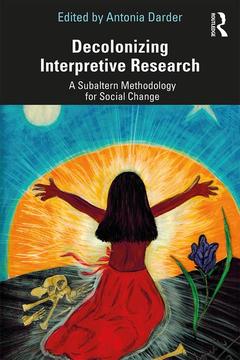Description
Decolonizing Interpretive Research
A Subaltern Methodology for Social Change
Coordinator: Darder Antonia
Language: English
Subject for Decolonizing Interpretive Research:
Keywords
Adolf Hitler; Interpretive Research; Graduate School Cohort; Decolonisation; Subaltern Scholars; Social Change; Superb; Antonia Darder; Colonial Administrations; Qualitative Methods; Subaltern Communities; Subaltern; Critical Bicultural Pedagogy; Western political interest; Critical Bicultural; colonializing epistemologies; Abyssal Divide; revolutionary partners; Maori Researcher; Racializing Class Formations; Social Reproduction; Subaltern Voice; Contemporary Societies; Subaltern Populations; Bicultural Voice; Colonial Matrix; Decolonizing Methodology; Service Learning; African Slave Trade; Daily Affirmation; Generational Tidal Wave; Subaltern Intellectuals; Poor Working Class Communities
Publication date: 06-2019
· 15.6x23.4 cm · Paperback
Publication date: 06-2019
· 15.6x23.4 cm · Hardback
Description
/li>Contents
/li>Readership
/li>Biography
/li>
To what extent do Western political and economic interests distort perceptions and affect the Western production of research about the other? The concept of 'colonializing epistemologies' describes how knowledges outside the Western purview are often not only rendered invisible but either absorbed or destroyed.
Decolonizing Interpretive Research outlines a form of oppositional study that undertakes a critical analysis of bodies of knowledge in any field that engages with issues related to the lives and survival of those deemed as other. It focuses on creating intellectual spaces that will facilitate new readings of the world and lead toward change, both in theory and practice. The book begins by conceptualizing the various aspects of the decolonizing interpretive research approach for the reader, and the following six chapters each focus on one of these issues, grounded in a specific decolonizing interpretive study.
With a foreword by Linda Tuhiwai Smith, this book will allow readers to not only engage with the conceptual framework of this decolonizing methodology but will also give them access to examples of how the methodology has informed decolonizing interpretive studies in practice.
Foreword Linda Tuhiwai Smith
Preface Antonia Darder
Part I. The Conceptual Foundation
Chapter 1. Decolonizing Interpretive Research Antonia Darder
Part II. Decolonizing Principles
Chapter 2. Centering the Subaltern Voice Kortney Hernandez
Chapter 3. Naming the Politics of Coloniality Emily Estioco Bautista
Chapter 4. Demythologizing Hegemonic Beliefs Kenzo Bergeron
Chapter 5. Epistemological Disruptions Bibinaz Pirayesh
Chapter 6. Emancipatory Re-readingsTerrelle Billy Sales
Afterword João Paraskeva
Index
Antonia Darder holds the Leavey Endowed Chair of Ethics and Moral Leadership at Loyola Marymount University and is Distinguished Visiting Faculty at the University of Johannesburg. She has published numerous books and her work focuses on political questions and ethical concerns linked to racism, class inequalities, language rights, critical pedagogy, cultural studies, and Latino education. More recently, her work has sought to contend with pedagogical questions of the body and the persistent impact of coloniality on community leadership and empowerment.



